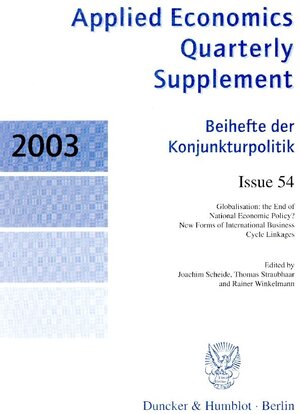Globalisation: the End of National Economic Policy?
New Forms of International Business Cycle Linkages.
herausgegeben von Rainer Winkelmann, Thomas Straubhaar und Joachim ScheideIn recent years, the integration of goods, capital and financial markets has progressed on a global scale. The 66th annual meeting of the Association of German Economics Research Institutes (ARGE) focused on the question of national macroeconomic policies in an environment of increasingly interdependent business cycles. In the first paper of the volume, Koll gives a general introduction to the history of business cycles co-movement. Koll also highlights the responsibility of national governments as global players. The first section deals with the evolution of business cycle synchronization. Flaig, Sturm and Woitek conclude that, while the oil shocks of the 70s induced strong co-movements in business cycles, German unification led to a divergence of national cycles. The paper by Fichtner concentrates not only on business cycle synchronization over time but introduces an analysis on the transmission mechanisms at work. Fichtner finds that common shocks and technology spillovers account for most of the co-movement in output. The second section explains some of the individual transmission mechanisms in greater detail. Horn examines how business confidence carries over from one country to another and finds evidence that positive expectations in the US strengthen German confidence and that this relationship has become stronger over time. Schröder quantifies the role of the transmission of stock market investors' confidence in the relationship between US and German GDP. He distinguishes between the pure investor expectation effect and the direct influence of stock markets on real GDP and finds a direct causal impact. The third section concentrates on economic policy and its implications. Kuhn analyzes the transmission of monetary policy shocks and finds the transmission mechanism via interest rate co-movements to be more important than that via trade and the exchange rate mechanism. Middendorf and Radmacher-Nottelmann explore the importance of multinationals in the transmission of economic business cycles. Macro evidence suggests a synchronization of investment behavior. Micro evidence, however, reveals only a weak impact of multinationals on business cycle synchronization. This AEQ supplement should be essential reading for anyone, whether academic or practitioner, with an interest in future macroeconomic policy options in an increasingly integrated economic environment.






